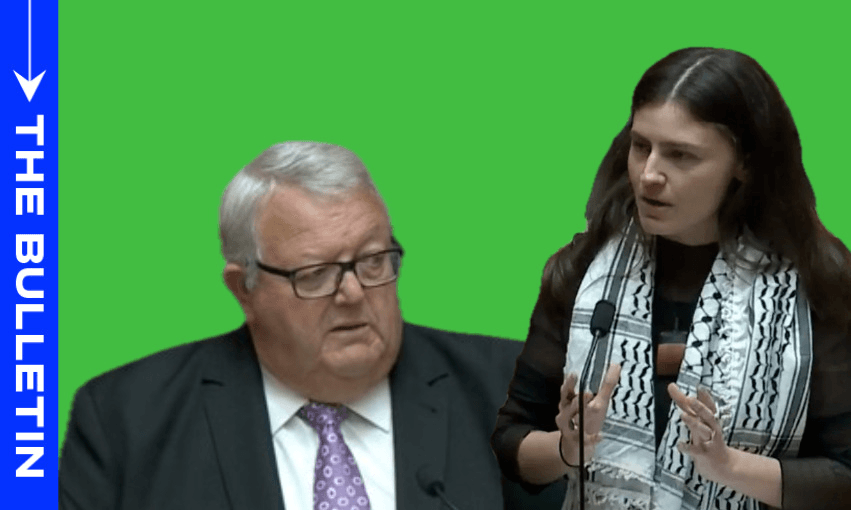Disquiet over the unusually harsh punishment is fuelling tensions among MPs on the issue of Palestinian statehood, writes Catherine McGregor in today’s extract from The Bulletin.
To receive The Bulletin in full each weekday, sign up here.
Swarbrick’s stand-off enters third day
Green Party co-leader Chlöe Swarbrick was yesterday suspended from Parliament for the rest of the week after again refusing to apologise for her remark urging “government MPs with a spine” to back her bill sanctioning Israel. The clash with Speaker Gerry Brownlee began on Tuesday, when Swarbrick refused to withdraw the comment during a snap debate on Palestinian statehood. Brownlee ejected her for the day, and warned she could not return without an apology. For more on Tuesday’s events, read Lyric Waiwiri-Smith’s latest Echo Chamber column for The Spinoff.
On Wednesday, after a private meeting failed to resolve the standoff, Swarbrick entered the debating chamber, Brownlee again asked her to apologise, and she declined. After she refused his first request to leave, Brownlee moved to “name” her – a formal disciplinary step triggering a suspension. Brownlee said he was coming down hard on Swarbrick because she delivered the “personal insult” during a speech to the House, not as an interjection.
Speaker’s powers under scrutiny
Speaking after her second ousting, Swarbrick said Brownlee was operating under a double standard, noting that John Key in 2015 had called for the opposition to “get some guts” in a speech, without being punished at all. Writing in The Spinoff, constitutional law expert Andrew Geddis says Brownlee’s approach appears to go beyond what Parliament’s rules allow. Standing Order 90(1) empowers the Speaker to eject an MP only “for the remainder of that day’s sitting” – not to impose an open-ended ban until an apology is made. Geddis contrasted this with the treatment of Labour’s Willie Jackson earlier this year, who was ordered out for calling Act leader David Seymour a liar – in a speech – but returned the next day without apologising.
The one-day rule goes back almost a quarter-century, Geddis notes. In 2001, then Speaker Jonathan Hunt ruled on the issue, confirming that once an MP has left for refusing to apologise, “the matter is at an end”. By effectively rewriting that precedent, Geddis argues, Brownlee appears to have created “a disciplinary consequence that appears nowhere” in the Standing Orders – parliamentary rules that are meant to stay the same, no matter the Speaker.
Recognition debate drags on
The row over Swarbrick’s suspension comes against a backdrop of growing frustration at the government’s slow progress on Palestinian statehood. Australia, Canada, France and the UK have announced recognition plans ahead of next month’s UN General Assembly, but New Zealand has only said it will have made a decision by then. Labour leader Chris Hipkins says the government is “waiting for other countries to take a principled stance before we’re willing to do so”, while Audrey Young of the NZ Herald (paywalled) calls the approach “the classic bob-each-way position of a small state” – seeking to avoid alienating Israel, Palestine or their respective supporters.
For Swarbrick, the delay is unconscionable. “We are a laggard, we are an outlier … We are one of the very few countries in the world who, so far, refuse to acknowledge the absolute bare minimum,” she told the House before her first ejection.
Act’s hard line complicates talks
One reason for the hold-up is Cabinet’s current consensus rule, which effectively gives each coalition partner a veto on any decision. In Politik (paywalled), Richard Harman reports that Act “appears to be” the brake on recognition of Palestinian statehood, by pushing for it to be contingent on Hamas releasing all Israeli hostages – a precondition not shared by leaders in Australia, Canada or the UK. Prime minister Christopher Luxon has echoed Act’s position in recent comments, leaving New Zealand out of step with its allies and, says Harman, showing up the “fundamental weakness” of this government: “that the prime minister appears unable to confront his coalition partners when they dig their heels in”.
Yet Luxon also used his strongest language yet on Israel yesterday, calling the situation in Gaza “utterly, utterly appalling” and claiming Israeli prime minister Benjamin Netanyahu had “lost the plot”, reports the Herald’s Jamie Ensor. Luxon’s criticism suggests frustration at both the worsening situation in Gaza and the political deadlock at home. Whether that frustration will ultimately translate into recognition of Palestine remains an open question.
Subscribe to NameEmail+Sign up to

